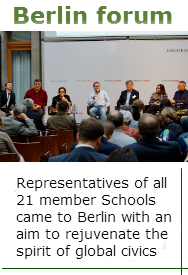Summer University for democracy
Opening statement by Terry DAVIS, Secretary General of the Council of Europe
Schools of Political Studies
Strasbourg, 10-14 July 2006
Democracy is a human creation. It is a progressive and fair form of government, but it does not follow the laws of nature. Democracy is neither predestined nor automatic. It does not simply happen. If we want democracy, we must work for it.
Democracy is much more than an electoral code. It is a code of behaviour, an attitude and a state of mind. Of course democracy requires laws to function, but legislation is there to provide support, not substance.
Democracy is about participation, leadership and accountability. All require knowledge, skills and information.
This is what Schools of Political Studies are all about. Since the creation of the first School in Moscow in 1992, the Schools have been training people who dare to think, dare to know, dare to speak and dare to act in the interest of democracy, human rights and the rule of law.
I have already mentioned the Moscow School of Political Studies, and I want to pay tribute to its founder, Lena Nemirovskaia, who had the courage and – equally important – the stamina to launch this adventure, and who continues to inspire everyone involved in the further development of the network. But I welcome not only the participants from Moscow but also the people from Sofia, Tbilisi, Skopje, Belgrade, Pristina, Chisinau, Bucharest, Yerevan and Kyiv. I also want to greet delegations from Sarajevo, Baku, and Minsk who are with us to share this unique experience and to seek ways to launch similar projects in their countries.
This first plenary meeting is going to discuss the challenges of today to democracy in Europe.
There are many such challenges, but perhaps the biggest challenge is the need to encourage and motivate citizens to take part in the political process. In many of our member countries, a substantial part of the electorate is simply no longer interested. This is dangerous because democracy cannot function without voters.
At the same time, a growing number of people, dissatisfied with mainstream politics, seek answers in fringe, populist, nationalist and often extremist politicians, who shamelessly cater to their frustration, fears and prejudices. In most cases, these politicians seek political profit from setting off one human misery against another, without any regard for the consequences and no interest in finding genuine solutions. Obviously, this too is a dangerous development.
There are many complex reasons for this state of affairs, and we should resist the temptation to look for simplistic solutions. If people are losing their trust in political institutions we must ask why. If people complain, we cannot simply tell them that they are wrong, or that they are asking the wrong questions. There are no wrong questions, only wrong answers. If we do not provide the right answers, populist and extremists will provide the wrong ones.
If we want our democracies to work, we need individuals whose personality and mindset, whose attitudes towards each other, towards society as a whole and towards knowledge and the acquisition of knowledge mean that they act democratically.
Democracy, good governance and human rights cannot be discussed in isolation. Democracy is a process, not an event, and it is much more than an election every few years. Participation is the key to fostering democracy and good governance, but participation is more than electoral turnout. And it must apply equally to all segments of society. Social exclusion is itself a threat to democracy. But it is also wrong. It is the antithesis of democracy. And let us remember that it is not only a question of exclusion on the basis of religion or ethnic origin.
Gender equality is also crucially important. A month ago, Finland celebrated a hundred years since the right to vote was given to women. It was the first country in Europe and the third in the world, after New Zealand and Australia, to enfranchise women. A century later, women vote and are elected across Europe, but they are still seriously under-represented in political and public decision-making posts and continue to face difficulties in becoming involved in the political process.
According to the latest data collected by the Council of Europe on the participation of women in national parliaments, the actual average percentage is 21 % and in national governments 20%. This is well below the Council of Europe target of 40% set in 2003 by the Committee of Ministers, which, incidentally, does not fare any better with only 10 women among 46 Ministers of Foreign Affairs – 22%.
The status quo is blatantly unfair, and it is also detrimental to the political, social and economic development of society. I also note that only one third of those present here today are women, so perhaps this should be one of the subjects to be discussed this week.
It is often said that democracy is like oxygen because people do not pay any attention until they are deprived of it. I am not sure that this is entirely true. People are paying attention, but they want the real thing – a democracy which is fair, inclusive, honest and functional. The bottom line is that people want democracy – but they do not always trust its institutions – and our task – your task - is to find ways of restoring this trust.








